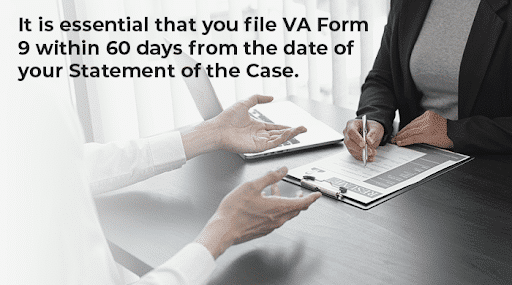VA Form 9 – Your Ticket to the VA Appeals Process
Navigating the veterans claims through the U.S. Department of Veterans Affairs can be a time-consuming a frustrating process. There are many steps involved in filing a VA claim, and the VA may deny your VA claim or offer fewer VA disability benefits than you think you deserve.
Fortunately, veterans are able to appeal the decision, provide additional evidence, and seek more VA benefits. And this starts with VA Form 9. If you’re looking to appeal the VA’s decision to seek more disability compensation, this guide will walk you through the basics of the VA appeals process.
Starting The Disability Claim Process
If you have had any sort of interaction with the VA, you know that dealing with getting benefits and/or healthcare is a long, painstaking process that all too often ends up being fruitless. First, you have to file a claim. Your local Regional Office will then (after a long time) give you a rating decision for the claim, determining service connection (and if so, what at what rating). If you disagree with this decision, you have to file a Notice of Disagreement within one year.
Then you have to wait a couple more years while your appeal goes through either a Decision Review Officer or the traditional VA appeals process (with a fresh set of eyes). During this stage the VA might send you notices of information they are seeking, called VCAA notices, that help them determine what their decision will be. They may even ask you to take a medical exam, called a C&P exam, to provide additional information about your disability and help them with their decision. After all this work they will still probably deny your claim and send you something titled “Statement of the Case”.
VA Form 9: Filing a Substantive Appeal
At this point, it’s been years of frustrating calls and seemingly endless waiting in the hamster wheel that is your VA regional Office trying to get your claim granted. This process can be disheartening, but there is a light at the end of the tunnel: the Board of Veteran’s Appeals or BVA. Here, there is a much better chance of getting a grant of benefits from the more sophisticated and experienced Veteran’s Law Judges than you ever would at the Regional Office.
This is where the VA Form 9 comes in. Once you have a Statement of the Case (SOC) in hand from your Regional Office, you can start the road to the BVA. To better understand this process, first, we have to talk about jurisdiction. Jurisdiction literally means the authority to hear a case. This is important because the BVA does not have the authority to hear your case until you have been through your Regional Office. All initial claims, and initial appeals (started through your Notice of Disagreement), are within the jurisdiction (authority) of the Regional Office. A Statement of the Case, given to a veteran by the Regional Office after an appeal, is your door to entering the jurisdiction of the BVA.
At this point, you must file a VA Form 9 to start the ball rolling—it’s your ticket through the door that the Statement of the Case opened. You can find VA Form 9 on va.gov. It is essential that you file this appeal form within 60 days from the date of your Statement of the Case. If you file it after more than 60 days, you lose your chance to get to the BVA. You file this form with the Regional Office (remember they still have authority over your case), and they then have to certify your appeal to the BVA. This certification process can take a couple of months, but eventually, you will receive a notification from the Regional Office that your appeal has been certified to the BVA. At this point, congratulations! You have managed to escape the seemingly never-ending cycle of Regional Office woes and have reached the BVA.
A VA appeal hearing is one of the main steps in the appeals process. According to the VA, there are several types of hearings that veterans can choose from. These include:
- Videoconference hearing at a local VA office
- In-person hearing at a local VA office
- In-person hearing at the Board of Veterans Appeals in Washington, D.C
Veterans can also opt out of a board hearing and send a letter instead. Some veterans will choose to work with a Veteran Service Officer (VSO) to navigate the appeals process and choose the best type of hearing for them.
You can learn more about the appeals process in other Hill & Ponton blog posts.
Appealing Your VA Claim?
If you are interested in appealing the VA’s decision on your disability compensation claim, the team at Hill & Ponton can help. Our attorneys are committed to supporting veterans and their family members through the disability claims process. Contact us for a free case evaluation.






